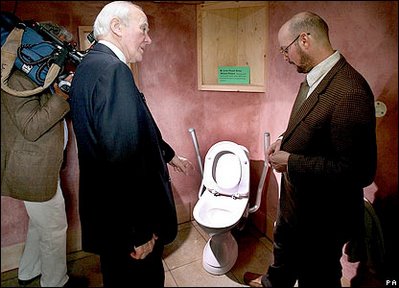So. Farewell Then. Menzies Campbell.
Very little overall surprise that Ming Campbell has been unceremoniously forced out as Liberal Democrat leader, jumping before he became the victim of a death of a thousand cuts like Charles Kennedy; more that it has been both so soon and so sudden. There were murmurings at the Liberal Democrat conference, mostly stirred by the media who can think of nothing more boring than a week of actual discussion of new policies when they can challenge an under-performing leader, but it was assumed that there would be something of a more dignified hand-over approaching the changing of the guard in Labour earlier in the year, rather than this brutal and humiliating exit for Ming.
The challenge, more than anything, was two-fold: firstly, Ming simply wasn't Charles Kennedy. The country as a whole would probably have preferred chatshow to stay in the top job regardless of whether he needed to tackle his drinking problem. That he was also seen as being at least partially responsible for Kennedy's demise also didn't help. However hard Ming tried, and he did, with his speech at the conference being decent if rather frightening because most people had never seen Campbell visibly angry and so apparently determined to make the best of it, he simply couldn't be equal to the easy charm and ordinariness that radiated from Kennedy. Secondly, the Lib Dem's three main, easily identifiable, rallying cry policies have all either fallen by the wayside or diminished in value. Iraq is still a disaster, but it's one we're getting out of shortly; student top-up fees have been slightly lightened by the government's reintroduction of grants; and their 50p top-rate of tax on those earning over £100,000 a year has evolved into the more fashionable green taxes.
Add into this mix Cameron's success with the Conservatives, resulting in some floating voters' returning to the Tories, especially, if the polls are to be believed, enthused by the Tories' inheritance tax pledge, and this, rather than Ming's actual leadership are what has left the party in an apparent mess.
Ming's victory back in January last year was itself such a compromise. Simon Hughes had been the victim of an outting by force by the Scum, the Mark Oaten "scandal" had just occurred, while Ming's other main opponents, Nick Clegg and Chris Huhne had neither the recognition factor nor the support within the party to stand in the way of the heir apparent. At best Ming was only going to lead the party into the next election and no further: holding onto the gains made under Kennedy once two-party politics was re-established was to be his real challenge, rather than furthering them, impressive victories in a couple of by-elections or not, and even this strategy was undermined by the changes in the political wind and the Lib Dems' actual policies.
The biggest tragedy is perhaps that Campbell, out of all the current "big three" political leaders was by far the most honest, urbane and principled. He needed some prompting from Charles Kennedy before he was totally sold on opposition to the Iraq war, but he soon became associated as the only person in any position of authority that was asking the pertinent questions needed. The term "flawed prospectus" may not have been most passionate denunciation of an illegal conflict that has led to the deaths of so many, but it was Ming's way of landing a blow without opening himself up to any of the easy smears of either being a defeatist, an apologist or an anti-American. Despite his poor performances at prime minister's questions, where he seemed out of his depth to begin with, he improved, and he was always surest when in actual debate, not the mock Punch and Judy version served up on Wednesday lunchtimes. He shined on a recent Question Time, but doing so there was never going to turn the polls his way.
That was perhaps his downfall: he lacked the killer instinct that those who are really successful require. True, Charles Kennedy didn't have it either, but then he was up against Blair and Hague and Blair and Howard, a choice to make any believer in genuine political choice shudder. Again, that also hasn't changed under Brown and Cameron, but some seem convinced enough that it has to demand a change. The obvious successor is Nick Clegg: solid enough at Home Affairs, but one of the "Orange Book" liberals, and nowhere near as genial as either Ming or Kennedy. The Liberal Democrats might gain in the short term, but politics tonight in this country is the poorer for Campbell's unhappy, isolated resignation. The only bright spot is that his tenure came nowhere near to the disaster that was Iain Duncan Smith's of the Tories, and that is very little comfort.
Labels: Liberal Democrats, Ming Campbell, Nick Clegg, politics




